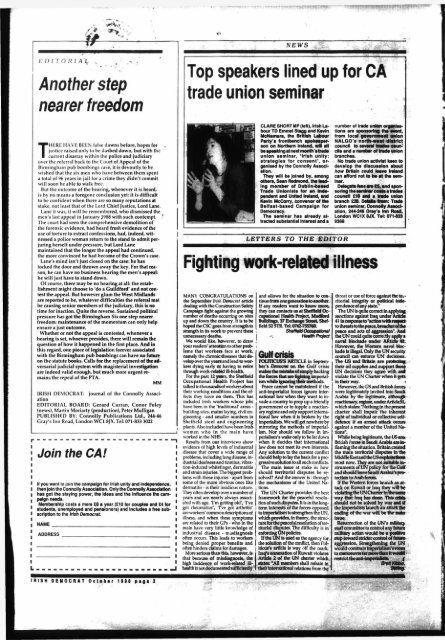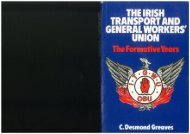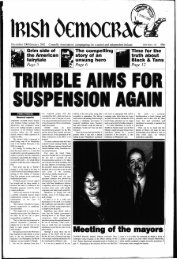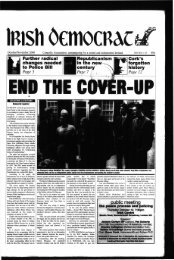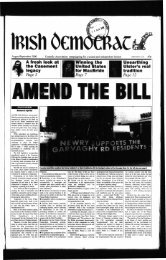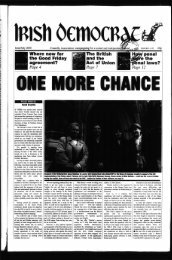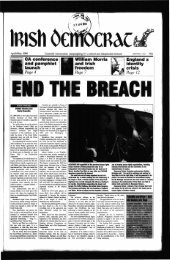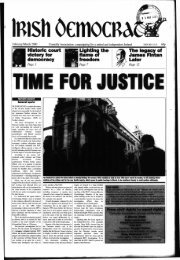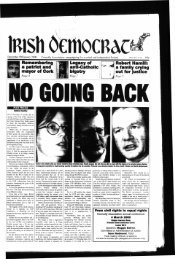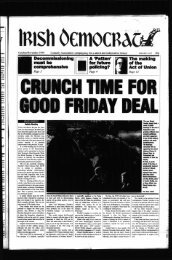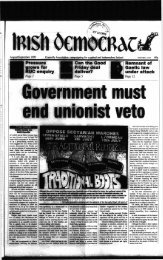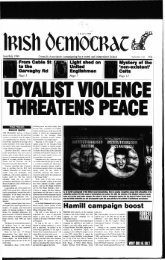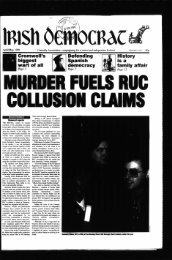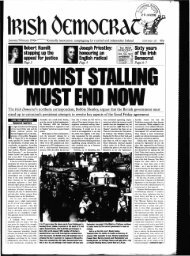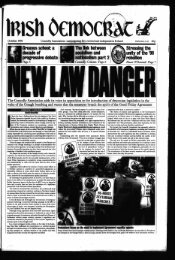Irish Democrat October 1990
You also want an ePaper? Increase the reach of your titles
YUMPU automatically turns print PDFs into web optimized ePapers that Google loves.
NEWS<br />
i*<br />
E D I T O R I A L ..<br />
Another step<br />
nearer freedom<br />
Top speakers lined up for CA<br />
trade union seminar<br />
Anti-national revisionism in Ireland is just one aspect of a global phenomenon<br />
THERE HAVE BEEN false dawns before, hopes for<br />
justice raised only to be dashed down, but with the<br />
current disarray within the police and judiciary<br />
over the referral back to the Court of Appeal of the<br />
Birmingham pub bombings case, it is devoutly to be<br />
wished that the six men who have between them spent<br />
a total of 96 years in jail for a crime they didn't commit<br />
will soon be able to walk free.<br />
But the outcome of the hearing, whenever it is heard,<br />
is by no means a foregone conclusion yet: it is difficult<br />
to be confident when there are so many reputations at<br />
stake, not least that of the Lord Chief Justice, Lord Lane.<br />
Lane it was, it will be remembered, who dismissed the<br />
men's last appeal in January J988 with such contempt. , r<br />
The court had seen the comprehensive demolition of<br />
the forensic evidence, had heard fresh evidence of the<br />
use of torture to extract confessions, had, indeed, witnessed<br />
a police woman return to the stand to admit perjuring<br />
herself under pressure, but Lord Lane<br />
maintained that the longer the appeal had continued,<br />
the more convinced he had become of the Crown's case.<br />
Lane's mind isn't just closed on the case: he has<br />
locked the door and thrown away the key. For that reason,<br />
he can have no business hearing the men's appeal:<br />
he will just have to stand down.<br />
Of course, there may be no hearing at all: the establishment<br />
might choose to 'do a Guildford' and not contest<br />
the appeal. But however glum the West Midlands<br />
are reported to be, whatever difficulties the referral mat<br />
be causing senior members of the judiciary, this is no<br />
time for inaction. Quite the reverse. Sustained political<br />
pressure has got the Birmingham Six one step nearer<br />
freedom: maintenance of the momentum can only help<br />
ensure a just outcome.<br />
Whether or not the appeal is contested, whenever a<br />
hearing is set, whoever presides, there will remain the<br />
question of how it happened in the first place. And in<br />
this regard, one piece of legislation forever associated<br />
with the Birmingham pub bombings can have no future<br />
on the statute books. Calls for the replacement of the adversarial<br />
judicial system with magisterial investigation<br />
are indeed valid enough, but much more urgent remains<br />
the repeal of the PTA.<br />
MM<br />
IRISH DEMOCRAT: journal of the Connolly Association<br />
EDITORIAL BOARD: Gerard Curran, Conor Foley<br />
(news), Martin Moriarty (production), Peter Mulligan<br />
PUBLISHED BY: Connolly Publications Ltd., 244-46<br />
Gray's Inn Road, London WC1 8JX. Tel: 071-833 3022<br />
Join the CA!<br />
If you want to join the campaign for <strong>Irish</strong> unity and independence,<br />
then join the Connolly Association. Only the Connolly Association<br />
has got the staying power, the Ideas and the Influence the campaign<br />
needs.<br />
Membership costs a mere £8 a year (£10 for couples and £4 for<br />
students, unemployed and pensioners) and includes a free subscription<br />
to the <strong>Irish</strong> <strong>Democrat</strong><br />
NAME<br />
ADDRESS<br />
j<br />
'<br />
MANY CONGRATULATIONS on<br />
the September <strong>Irish</strong> <strong>Democrat</strong> article<br />
dealing with the Construction Safety<br />
Campaign fight against the growing<br />
number of deaths occurring on sites<br />
up and down the country. It is to be<br />
hoped the CSC goes from strength to<br />
strength in its work to prevent these<br />
unnecessary dea ths.<br />
We would like, however, to draw ,<br />
your readers'attention to other prob- i<br />
lems that workers face at work,<br />
namely the chronic diseases that develop<br />
over the yearsand lead to workers<br />
dying early or having to retire<br />
through work-related ill-health.<br />
For the past 12 years, the Sheffield<br />
Occupational Health Project has<br />
talked to thousands of workers about<br />
their working conditions and the effects<br />
they have on them. This has<br />
included <strong>Irish</strong> workers whose jobs<br />
have been in the 'traditional' areas -<br />
building sites, mains laying, civil engineering<br />
- and smaller numbers in<br />
Sheffield steel and engineering<br />
plants. Also included have been <strong>Irish</strong><br />
women who in the main have<br />
worked in the NHS.<br />
Results from our interviews show<br />
evidence of high levels of industrial<br />
disease that cover a wide range of<br />
problems, including lung disease, industrial<br />
deafness and tinnitus, vibration-induced<br />
whitefinger, dermatitis<br />
and strain injuries. The biggest problems<br />
with these injuries - apart from<br />
some of the more obvious ones like<br />
dermatitis - is their insidious nature.<br />
They often develop over a number of<br />
years and are nearly always associated<br />
with age. 'I'm getting old', 'I've<br />
got rheumatics', 'I've got arthritis'<br />
are workers' common descriptions of<br />
illness, and when these symptoms<br />
are related to their GPs - who in the<br />
main have very little knowledge of<br />
industrial disease - misdiagnosis<br />
often occurs. This leads to workers<br />
being denied proper benefits and<br />
often hinders claims for damages.<br />
More serious than this, however, is<br />
that because of misdiagnosis, the<br />
high incidence of work-related illhealth<br />
is not documented sufficiently<br />
CLARE SHORT MP (left), <strong>Irish</strong> Labour<br />
TD Emmet Stagg and Kevin<br />
McNamara, the British Labour<br />
Party's frontbench spokesperson<br />
on Northern Ireland, wHI ail<br />
be speaking at next month'strode<br />
union seminar, '<strong>Irish</strong> unity:<br />
strategies for consent', organised<br />
by the Connolly Association.<br />
They will be joined by, among<br />
others, Sean Redmond, the leading<br />
member of Dublin4>ased<br />
Trade Unionists for an Independent<br />
and United Ireland, and<br />
Kevin McCorry, convenor of the<br />
Belfast-based Campaign for<br />
Democracy.<br />
The seminar has already attracted<br />
substantial interest and a<br />
LETTERS TO THE EDITOR<br />
and allows for the situation to continue<br />
from one generation to another.<br />
If any readers want to know more,<br />
they can contacts us at Sheffield Occupational<br />
Health Project, Mudford<br />
Buildings, 37 Exchange Street, Sheffield<br />
S2 5TR. Tel: 0742-755760.<br />
Sheffield Occupational<br />
Health Project<br />
Gulf crisis<br />
POLITICUS'S ARTICLE in September's<br />
<strong>Democrat</strong> on the Gulf crisis<br />
mates the mistake of simply backing<br />
the forces that are fighting imperialism<br />
while ignoring their methods.<br />
Peace cannot be maintained if the<br />
anti-imperialist forces ignore international<br />
law when they want to invade<br />
a country to prop up a friendly<br />
government or to topple a reactionary<br />
regime and only support international<br />
law when it is broken by the<br />
imperialists. We will get nowhere by<br />
mirroring the methods of imperialism.<br />
Nor should we follow in imperialism's<br />
wake only to be let down<br />
when it decides that international<br />
law does not meet its own interests.<br />
Any solution to the current conflict<br />
should help to lay the basis for a progressive<br />
solution to all such conflicts.<br />
The main issue at stake is: how<br />
should territorial disputes be resolved?<br />
And the answer is: through<br />
the mechanisms of the United Nations.<br />
The UN Charter provides the best<br />
framework for the peaceful resolution<br />
of such disputes. It is in the longterm<br />
interests of the forces opposed<br />
to imperialism to strengthen the UN,<br />
which provides, in theory, the structure<br />
for the peaceful resolution of territorial<br />
disputes. The difficulty is in<br />
enforcing UN policies.<br />
If the UN is used as the agency for<br />
the solution of the conflict, then Politicus's<br />
article Is way off the mark.<br />
Iraq's annexation of Kuwait violates<br />
Article 2 of die UN charter which<br />
states: "AO members shall refrain in<br />
their International relations from the<br />
number of trade union organisations<br />
are sponsoring the event,<br />
from local government union<br />
NALGO's north-west district<br />
council to several trades councils<br />
and a number of trade onion<br />
branches.<br />
No trade union activist keen to<br />
develop the discussion about<br />
how Britain could leave Ireland<br />
can afford not to be at the seminar.<br />
Delegate fees are £5, and sponsoring<br />
the seminar costs a trades<br />
counell £10 and a trade union<br />
branch £20. Details tram: Trade<br />
union seminar, Connolly Association,<br />
244-246 Gray's Inn Road,<br />
London WC1X 8JX. Tel: 071-833<br />
9368<br />
threat or use of force against the territorial<br />
integrity or political independence<br />
of any state." J.<br />
The UN is quite correct in ap<br />
sanctions against Iraq under J<br />
41 in response to "action with respect<br />
to threats to the peace, breaches of the<br />
peace and acts of aggression". And<br />
the UN could quite correctly apply a<br />
naval blockade under ARtide *2.<br />
However, the Western naval blockade<br />
is illegal. Only the UN security<br />
council can enforce UN decisions.<br />
The US and Britain are protecting<br />
then* oil supplies and support those<br />
UN decisions they agree with and<br />
violate the UN Charter when it gets<br />
in their way. -1<br />
However, the US and British forces -<br />
were legitimately invited into Saudi<br />
Arabia by the legitimate, although<br />
reactionary, regime, under ArticleSl,<br />
which states: "Nothing in the present<br />
charter shall impair the inherent<br />
right of individual or collective selfdefence<br />
if an armed attack occurs<br />
against a member of the United Nations".<br />
While being legitimate, the US ami<br />
British forces in Saudi Arabia are inflaming<br />
the situation. Britain created<br />
the main territorial disputes tn the<br />
Middle Eastandthe US exptoitsdMMi<br />
most now. They are not suitable Instruments<br />
of UN policy for the Gulf<br />
and should leave Saudi Arabia's protection<br />
to Arab forces.<br />
If the Western forces launch an attack<br />
on Kuwait or Iraq they wiH tie<br />
violating the UN Charter in die same<br />
way that Iraq has done. This crisis<br />
should not be solved by war and if<br />
the imperialists launch an attack {he<br />
ending of the war will be the main<br />
issue.<br />
Resurrection of the UN's military<br />
staff committee to control any future<br />
military action would be a positive<br />
step toward stricter control of future<br />
aggression. Strengthening the UN<br />
would constrain imperialism's room<br />
to manoeuvre far morethan It wtfft ><br />
restrict the anti-imperialists.<br />
BrettI<br />
REVISIONIST' history-writing<br />
was a global phenomenon<br />
in the 1970s and 1980s<br />
and that the <strong>Irish</strong> experiencecould<br />
mostusefully be<br />
studied against that backdrop, contended<br />
Dr Declan Kiberd at the Desmond<br />
Greaves Summer School held<br />
in Dublin over the August bank holiday<br />
weekend<br />
Dr Kiberd, who has just been appointed<br />
to English Professorship at<br />
University College Galway, was<br />
speaking on the theme 'Democracy<br />
and Post-Colonial Culture'.<br />
Until the late 1960s, he said, the<br />
Western intelligentsia had offered<br />
generally warm support to anti-colonial<br />
struggles in Algeria, Palestine,<br />
Iran, Vietnam and so on. But in the<br />
following decades, with the emergence<br />
of Aminin Africa, Khomeini in<br />
Iran and Pol Pot in Asia, Hie image of<br />
'freedom-fighter' was replaced by.<br />
that of 'terrorist'. Some post-colonial<br />
regimes were indeed barbaric; others<br />
merely incompetent; but support for<br />
either was equated with 'pro-Soviet<br />
activity.'<br />
So the radical critique of colonialism,<br />
which had been pioneered by<br />
thinkers like Bertrand Russell and<br />
Jian-Paul Sartre, wag replaced by a<br />
newer, more fashionable thesis of<br />
'tite self-inflicted wound'. One of its<br />
major sponsors, V.S. Naipul, argued<br />
for example thatitwasthe underdevelopment<br />
of ego in native religions,<br />
natter than the economic depredations<br />
of colonialism, which accounted<br />
for India's apparent-<br />
*ipperhack exposes ofThird World<br />
• crises, such as Naipul's, proved<br />
popularamong Western intellectuals<br />
^^EVISION, in the academic<br />
fctsense, is the very essence of the<br />
• "historian's craft? Kit the professional<br />
meaning of the word is not<br />
what people have in mind when 'revisionism'<br />
and 'revisionist' are bandied<br />
about so lightly in popular<br />
commentary today: In its popular<br />
sense it is loaded -with political<br />
meaning, and is a term of abuse ap-<br />
Splifd to those who arc reckoned to<br />
have strayed from the 'nationalisf<br />
interpretation of <strong>Irish</strong> history.<br />
So said Professor Donal McCartney,<br />
who teaches modern <strong>Irish</strong> History<br />
at University College Dublin, in<br />
his lecture on 'History Revisions -<br />
^ Good and Bad' to. this year's Desmond<br />
Greaves Weekend Summer<br />
School, thus becoming the first academic<br />
historian from within Ireland<br />
'to align himself with the anti-revi-<br />
- pionist assault of Cambridge's Dr<br />
Brendan Bradshaw (reported in the<br />
<strong>Irish</strong> <strong>Democrat</strong> July <strong>1990</strong>).<br />
. When the Northern problem<br />
erupted, Professor McCartney said, it<br />
was inevitable that the-time-hon-<br />
means Of <strong>Irish</strong> republicanism would<br />
be called into question by some ('re-<br />
who were coming to the conclusion H<br />
that when the British left India (or II<br />
Iran, or southern Ireland ...), things MH<br />
only got worse. By a subtle modula- llM<br />
all remaining British guilt about<br />
the colonial adventure could be ex- ^^H<br />
punged, because one of the talented, j|H<br />
witty natives of the post-colonyhad I<br />
given permission for this, and in the I<br />
modulated eighteenth-century peri- \ J<br />
ods which readers of The Observer H<br />
could recognise and approve.<br />
writers like Salman L&<br />
refused to translate<br />
messy Third chaos well- -<br />
bred prose; and, instead, accuse Nai- I<br />
pul of a fatal willingness to pose<br />
Third world questions in the lan- I<br />
guage of the West. Rushdie would I<br />
see Naipul as an elegant exam- I<br />
passer, performing rationalist tricks<br />
for his masters, but filled deep down IB<br />
self-loathing. IflK |<br />
has accused Oxbridge-trained Indian<br />
historians of working to a similar self B<br />
censoring formula.<br />
The most coruscating critique of • REMEMBERING THE PAST: British trade union leaders failed to deliver significant solidarity with their <strong>Irish</strong><br />
such revisionism in the Third World brothers and sisters during the 1913 Dublin lock-out. This rare picture from the meeting between Dublin strike<br />
has come from writers, not academ- leaders and the British TUC captures just how unimpressed the event left Connolly (far right)<br />
ics. Rushdie's-greatest novel, Midnight's<br />
Children, accuse? India of<br />
producing "a nation of forgetters." munity suffered a similar amnesia, as nated version, because it was radi- undergoing a post-revisionist movement,<br />
led by writers like Rushdie and<br />
The childretfof independence "mis- people forgot "the name and notion cally opposed to the false one that<br />
laid their powers of retention, so that of things" and "sank into an idiocy historians had created and consethey<br />
had become incapabie af judge- that had no past." Everything failed crated in theschoolbooks." Ultimatenings<br />
of such a trend were discern-<br />
Marquez; and in Ireland the beginment,<br />
having forgotten everythingto in consequence-industry was lost in ly, the people of Macondo in the ible. Poems like Kennelly's Cromwell<br />
which they could compare anything<br />
"a quicksand offorgetfulness", and a novel are made to believe that the<br />
•or plays such as Friel's Making History<br />
had restored some sense of the<br />
'that-had happened." Instead,theytry massacre of workers was "disap- Yankee banana company and its true complexity of political protagonists,<br />
to turn themselves into magicians pea'red" in the single phrase 'There hired killers never existed at all.<br />
to the point v. here they could<br />
who concentrate upon the present weren't any dead." In the end only <strong>Irish</strong> people would have no diffi- no longer be recruited by sentimental<br />
"with the monomania &f snails." one honest man in the novel remem- culty spotting native versions of Nai- nationalists, on the one hand, or by<br />
In his novel One Hundred Years- of bers what the facts truly were, pul or in finding analogies in the anti-national propagandists, on the<br />
Solitude, Gabriel Garcia Marquez de- "though, of course, one would have rewriting of our history. Places like other.<br />
scribes how a latin American com- thought that he was telling a halluci- India and Latin-America were now<br />
-tSSsSKsm<br />
visionists') and defended by others<br />
Cantirrevisionist&'). Some of the most<br />
articulate politicians at the centre of<br />
this debate - Garret FitzGerald, John<br />
Hume, and Conor Cruise O'Brien -<br />
were themselves history graduates<br />
and products of what has been called<br />
'the historiographical revolution' in<br />
our universities, and they were<br />
bound to lace their political arguments<br />
with h ; torical allusions.<br />
When profession ll historians rushed<br />
to join the debate revisionism had<br />
come to Ireland with a vengeance.<br />
The 'personality tult' - of Pearse in<br />
particular - came under attack. Romantic<br />
nationalism was "subjected to<br />
much diNichaiisid crjticism. The<br />
1916 Rishtewas portrayed in a colder<br />
light. T>emy thologising' wasapplied<br />
to every aspect of our past. Historica 1<br />
commentators urged our deliverance<br />
from "the false history that had for<br />
too long masqueraded as the real<br />
thing" and theories of nationality<br />
were re-examined. This kind of revisionism<br />
was quite clearly political in<br />
the past is leading usto abandon the<br />
republican tradition and to leave it.<br />
entirely in the hands of the Provisional<br />
IRA. It was in this general slippage<br />
that the once populist de Valera<br />
fell from public favour, and Michael<br />
Collins will no doubt come tumbling<br />
after.<br />
De Valera has been silently set aside<br />
even by Fianna Fciil while the more<br />
prosaic and business-oriented Lemass<br />
has replaced him in an ideological<br />
coup carried out by the present<br />
leaders of the party. The change of<br />
climate in the manner in which we<br />
view our past made it possible to<br />
accept the Anglo-<strong>Irish</strong> agreement<br />
and cooperate more closely on security<br />
matters with the old enemy.<br />
It could also be argued that recent<br />
<strong>Irish</strong> governments have been engaged<br />
in an attempt to induce national<br />
amnesia. 1916 is no longer<br />
officially commemorated although<br />
commemoration can allow for national<br />
reflection: it does not have to<br />
be triumphant'militarism.<br />
The removal of the Famine, Young<br />
Ireland; the 1848 Rebellion, the Fenians<br />
and the 1867 Rebellion from the<br />
Leaving Certificate History course<br />
may well be another result of our<br />
tendency to ignore such matters is<br />
rightly called 'passive evasion' or<br />
'removing the pain from <strong>Irish</strong> history'.<br />
Yet if the past has been an obstacle<br />
and a burden, knowledge of<br />
the past is the safest and surest emancipation.<br />
One of the consequences of galloping<br />
revisionism is that the Provi<br />
sional IRA has captured and<br />
occupied a segment of the territory of<br />
<strong>Irish</strong> history, have claimed it for<br />
themselves, exaggerated its role, distorted<br />
it and ended up with a gross<br />
caricature. 'Nationalist' has been narrowed<br />
to mean 'Republican', and<br />
'Republican' has been narrowed to<br />
mean physical force.<br />
"Professional historians have not<br />
been immune to these climatic<br />
changes of opinion, Professor<br />
McCartney concluded. "In his eagerness<br />
to condemn the extravagances<br />
and the indecencies committed in the<br />
name of republican nationalism the<br />
historian, influenced by political revisionism,<br />
has been tempted; into rejecting<br />
all nationalism in our history<br />
and into forgetting its genuine contributions<br />
to our liberty and democ-<br />
London<br />
Connolly<br />
Association<br />
Ireland - cause of<br />
Labour?<br />
Where next after Labour<br />
Party conference?<br />
8pm Wednesday<br />
10 <strong>October</strong><br />
Marchmont Street<br />
Community Centre,<br />
Marchmont Street,<br />
WC1 (nearest tube:<br />
Russell Square)<br />
All members and supporters<br />
welcome<br />
^<br />
IRISH DEMOCRAT <strong>October</strong> 1 990 page 2


